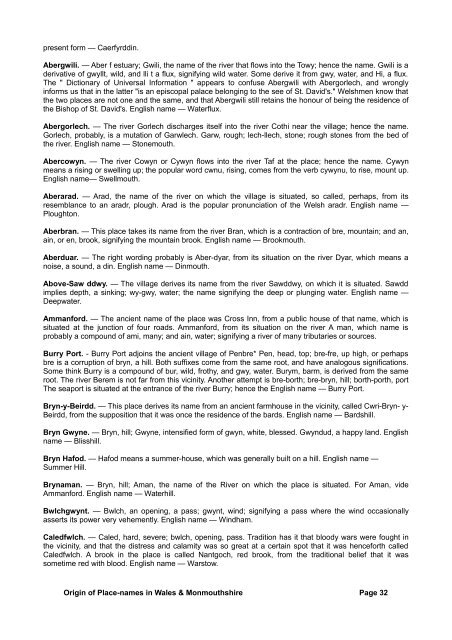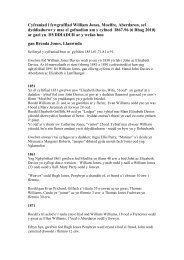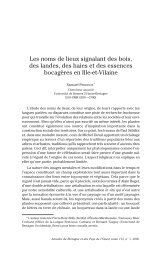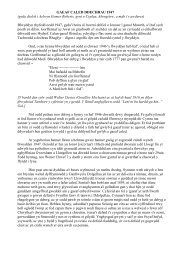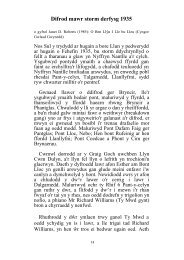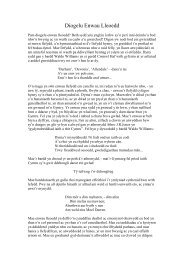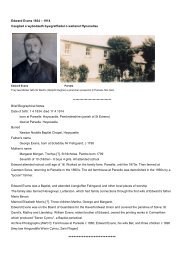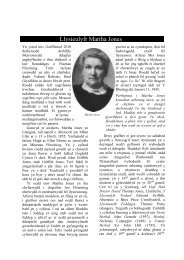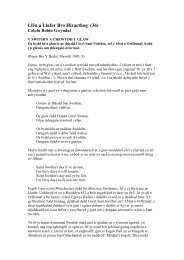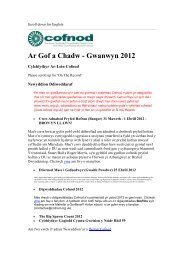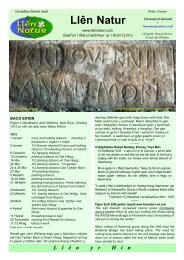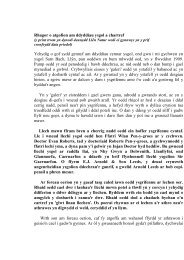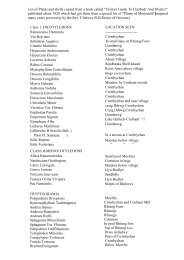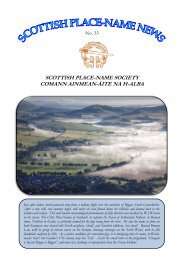Talsarn. — Tal, end; sarn, road ; from a branch <strong>of</strong> a Roman road which term<strong>in</strong>ated here. English name —Roadton.Traeth Saith. — Traeth, s<strong>and</strong>s, seashore; Saith is referred by some as Sei<strong>the</strong>d<strong>in</strong>, famous <strong>in</strong> Welshmythology. The small river that flows <strong>in</strong>to Traeth Saith is called Saeth, which means an arrow, so calledprobably from its arrow-like course. " As straight as an arrow " is a proverbial phrase. Perhaps it was socalled <strong>in</strong> contradist<strong>in</strong>ction from <strong>the</strong> river Ystwyth with its me<strong>and</strong>er<strong>in</strong>g course. The <strong>names</strong> Blaensaeth <strong>and</strong>Dyffryn Saeth, which are found <strong>in</strong> <strong>the</strong> vic<strong>in</strong>ity, <strong>in</strong>duce us to adopt <strong>the</strong> latter derivation. English name —Straighton.Trefilan. — The church was dedicated to Elen <strong>the</strong> mo<strong>the</strong>r <strong>of</strong> Constant<strong>in</strong>e <strong>the</strong> Great; <strong>the</strong>refore, Ban is amutation <strong>of</strong> Elen. Eglwys Ilan, Glamorgan, bears her name. English name — Ellenton.Treflyn. — A compound <strong>of</strong> tref, a <strong>place</strong>, a town; <strong>and</strong> llyn, a lake. The <strong>place</strong> takes its name from a beautifullake called Llyn y maes, <strong>the</strong> lake <strong>of</strong> <strong>the</strong> field, which, accord<strong>in</strong>g to tradition, covers <strong>the</strong> <strong>orig<strong>in</strong></strong>al site <strong>of</strong>Tregaron. English name — Laketon.Tregaron. — The church was dedicated to Bishop Caron, <strong>and</strong> <strong>the</strong> <strong>place</strong> is named <strong>in</strong> honour <strong>of</strong> him. Englishname — Carontown.Tremaen. — Tre, <strong>place</strong> ; maen, stone; its literal signification be<strong>in</strong>g " <strong>the</strong> town <strong>of</strong> <strong>the</strong> stone," so called from <strong>the</strong>noted stone, Llech yr ast, <strong>and</strong> <strong>the</strong> adjacent cistfaens near <strong>the</strong> village. English name — Stoneton.Troedyraur. — Troed, foot, base, lower part. Troed-y-bryn, <strong>the</strong> lowest part <strong>of</strong> <strong>the</strong> hill. Piedmont has <strong>the</strong> samesignification, from It. pie di monte, foot <strong>of</strong> <strong>the</strong> mounta<strong>in</strong>, so called from its situation. Yr, <strong>the</strong>; aur, probablywrongly-spelt for air, bright, clear. If we adopt <strong>the</strong> term<strong>in</strong>ation air, <strong>the</strong> name means <strong>the</strong> basement <strong>of</strong> a hill,from which a clear view may be had <strong>of</strong> <strong>the</strong> surround<strong>in</strong>g district. Some derive <strong>the</strong> name from <strong>the</strong> tradition thataur, gold, was discovered at <strong>the</strong> foot <strong>of</strong> <strong>the</strong> hill. It appears that <strong>the</strong> ancient name <strong>of</strong> <strong>the</strong> church was Tredeyrn,<strong>the</strong> k<strong>in</strong>g's town, from <strong>the</strong> supposition that Owa<strong>in</strong> ab Hywel Dda, <strong>the</strong> k<strong>in</strong>g <strong>of</strong> Ceredigion, some time took uphis abode <strong>in</strong> <strong>the</strong> vic<strong>in</strong>ity. Llys Owa<strong>in</strong>, Owen's court, <strong>the</strong> ru<strong>in</strong>s <strong>of</strong> which are still discernible, about a quarter <strong>of</strong> amile from <strong>the</strong> church, <strong>in</strong>cl<strong>in</strong>es us to th<strong>in</strong>k that Tredeyrn is <strong>the</strong> correct name <strong>of</strong> this <strong>place</strong>. English name —K<strong>in</strong>gton.Tynyswydd. — Ty, house; yn, <strong>in</strong>; y, <strong>the</strong>; swydd, jurisdiction. The house, from which <strong>the</strong> village takes itsname, was probably situated at <strong>the</strong> extreme end <strong>of</strong> <strong>the</strong> Mefenydd judicature. English name — Lexham.Ystrad Meurig. — Meurig is recorded to have been killed at a <strong>place</strong> where a church was dedicated to him.The <strong>place</strong> is also famous for its ancient sem<strong>in</strong>ary. Meyryg, son <strong>of</strong> Meirchion, was a brave, far-famed k<strong>in</strong>g. Inhis time <strong>the</strong> Irish Picts came to Cambria; he, however, marched aga<strong>in</strong>st <strong>the</strong>m, drove <strong>the</strong>m away, or slew<strong>the</strong>m; but was killed by an Irishman concealed <strong>in</strong> a wood, s<strong>in</strong>ce called Ystrad Meyryg." Iolo MSS., p. 352.English name — Meurig's Vale.Ystumtuem. — Ystum, a bend, a shape, a form; Tuem, <strong>the</strong> name <strong>of</strong> <strong>the</strong> river that flows through <strong>the</strong> <strong>place</strong>.Tuem probably is a compound <strong>of</strong> tu, a side, a region, a part; <strong>and</strong> an-a<strong>in</strong>, water, signify<strong>in</strong>g a piece <strong>of</strong> l<strong>and</strong> near<strong>the</strong> water. English name — Waterham.CARMARTHENSHIRE.Carmar<strong>the</strong>n is an Anglicized form <strong>of</strong> Caerfyrdd<strong>in</strong>. The Welsh Chronicle derives <strong>the</strong> name from Myrdd<strong>in</strong>, <strong>the</strong>pseudo-prophet <strong>and</strong> bard, <strong>and</strong> many are <strong>the</strong> traditions that boldly, but absurdly, support <strong>the</strong> derivation.History rejects this popular etymology by stat<strong>in</strong>g that <strong>the</strong> town was called " Maridunum " by <strong>the</strong> Romans,dur<strong>in</strong>g <strong>and</strong> after <strong>the</strong> Roman subjugation, long ere <strong>the</strong> prophet was born. The Kaervyrdd<strong>in</strong> <strong>of</strong> <strong>the</strong> Britons is <strong>the</strong>" Maridunum," <strong>the</strong> city by <strong>the</strong> sea, <strong>of</strong> Ptolemy ; <strong>and</strong> <strong>the</strong> " Muridunum," <strong>the</strong> walled city <strong>of</strong> Antonius. Some th<strong>in</strong>kthat <strong>the</strong> Lat<strong>in</strong> name is a translation <strong>of</strong> <strong>the</strong> Welsh one, <strong>and</strong> derive <strong>the</strong> latter thus: Caer, fortress, wall; fyr, amutation <strong>of</strong> mor-tnyr, <strong>the</strong> sea; d<strong>in</strong>-dd<strong>in</strong>, a hill ; signify<strong>in</strong>g a fortified hill upon or near <strong>the</strong> sea. O<strong>the</strong>rs ma<strong>in</strong>ta<strong>in</strong>that Caermyrdd<strong>in</strong>, <strong>the</strong> ru<strong>in</strong>ous city, is <strong>the</strong> true derivation. Ano<strong>the</strong>r derivation is <strong>of</strong>fered. Caerfyrdd-ddyn, <strong>the</strong>citadel <strong>of</strong> ten thous<strong>and</strong>, from myrdd, a myriad, <strong>and</strong> dyn t a man. We are <strong>in</strong>cl<strong>in</strong>ed to th<strong>in</strong>k that " Maridunum "is <strong>the</strong> etymology <strong>of</strong> <strong>the</strong> name, <strong>and</strong> that <strong>the</strong> Welsh caer was prefixed to it, <strong>and</strong> hence it was transmuted to itsOrig<strong>in</strong> <strong>of</strong> Place-<strong>names</strong> <strong>in</strong> Wales & Monmouthshire Page 31
present form — Caerfyrdd<strong>in</strong>.Abergwili. — Aber f estuary; Gwili, <strong>the</strong> name <strong>of</strong> <strong>the</strong> river that flows <strong>in</strong>to <strong>the</strong> Towy; hence <strong>the</strong> name. Gwili is aderivative <strong>of</strong> gwyllt, wild, <strong>and</strong> lli t a flux, signify<strong>in</strong>g wild water. Some derive it from gwy, water, <strong>and</strong> Hi, a flux.The " Dictionary <strong>of</strong> Universal Information " appears to confuse Abergwili with Abergorlech, <strong>and</strong> wrongly<strong>in</strong>forms us that <strong>in</strong> <strong>the</strong> latter "is an episcopal palace belong<strong>in</strong>g to <strong>the</strong> see <strong>of</strong> St. David's." Welshmen know that<strong>the</strong> two <strong>place</strong>s are not one <strong>and</strong> <strong>the</strong> same, <strong>and</strong> that Abergwili still reta<strong>in</strong>s <strong>the</strong> honour <strong>of</strong> be<strong>in</strong>g <strong>the</strong> residence <strong>of</strong><strong>the</strong> Bishop <strong>of</strong> St. David's. English name — Waterflux.Abergorlech. — The river Gorlech discharges itself <strong>in</strong>to <strong>the</strong> river Cothi near <strong>the</strong> village; hence <strong>the</strong> name.Gorlech, probably, is a mutation <strong>of</strong> Garwlech. Garw, rough; lech-llech, stone; rough stones from <strong>the</strong> bed <strong>of</strong><strong>the</strong> river. English name — Stonemouth.Abercowyn. — The river Cowyn or Cywyn flows <strong>in</strong>to <strong>the</strong> river Taf at <strong>the</strong> <strong>place</strong>; hence <strong>the</strong> name. Cywynmeans a ris<strong>in</strong>g or swell<strong>in</strong>g up; <strong>the</strong> popular word cwnu, ris<strong>in</strong>g, comes from <strong>the</strong> verb cywynu, to rise, mount up.English name— Swellmouth.Aberarad. — Arad, <strong>the</strong> name <strong>of</strong> <strong>the</strong> river on which <strong>the</strong> village is situated, so called, perhaps, from itsresemblance to an aradr, plough. Arad is <strong>the</strong> popular pronunciation <strong>of</strong> <strong>the</strong> Welsh aradr. English name —Ploughton.Aberbran. — This <strong>place</strong> takes its name from <strong>the</strong> river Bran, which is a contraction <strong>of</strong> bre, mounta<strong>in</strong>; <strong>and</strong> an,a<strong>in</strong>, or en, brook, signify<strong>in</strong>g <strong>the</strong> mounta<strong>in</strong> brook. English name — Brookmouth.Aberduar. — The right word<strong>in</strong>g probably is Aber-dyar, from its situation on <strong>the</strong> river Dyar, which means anoise, a sound, a d<strong>in</strong>. English name — D<strong>in</strong>mouth.Above-Saw ddwy. — The village derives its name from <strong>the</strong> river Sawddwy, on which it is situated. Sawddimplies depth, a s<strong>in</strong>k<strong>in</strong>g; wy-gwy, water; <strong>the</strong> name signify<strong>in</strong>g <strong>the</strong> deep or plung<strong>in</strong>g water. English name —Deepwater.Ammanford. — The ancient name <strong>of</strong> <strong>the</strong> <strong>place</strong> was Cross Inn, from a public house <strong>of</strong> that name, which issituated at <strong>the</strong> junction <strong>of</strong> four roads. Ammanford, from its situation on <strong>the</strong> river A man, which name isprobably a compound <strong>of</strong> ami, many; <strong>and</strong> a<strong>in</strong>, water; signify<strong>in</strong>g a river <strong>of</strong> many tributaries or sources.Burry Port. - Burry Port adjo<strong>in</strong>s <strong>the</strong> ancient village <strong>of</strong> Penbre* Pen, head, top; bre-fre, up high, or perhapsbre is a corruption <strong>of</strong> bryn, a hill. Both suffixes come from <strong>the</strong> same root, <strong>and</strong> have analogous significations.Some th<strong>in</strong>k Burry is a compound <strong>of</strong> bur, wild, frothy, <strong>and</strong> gwy, water. Burym, barm, is derived from <strong>the</strong> sameroot. The river Berem is not far from this vic<strong>in</strong>ity. Ano<strong>the</strong>r attempt is bre-borth; bre-bryn, hill; borth-porth, portThe seaport is situated at <strong>the</strong> entrance <strong>of</strong> <strong>the</strong> river Burry; hence <strong>the</strong> English name — Burry Port.Bryn-y-Beirdd. — This <strong>place</strong> derives its name from an ancient farmhouse <strong>in</strong> <strong>the</strong> vic<strong>in</strong>ity, called Cwri-Bryn- y-Beirdd, from <strong>the</strong> supposition that it was once <strong>the</strong> residence <strong>of</strong> <strong>the</strong> bards. English name — Bardshill.Bryn Gwyne. — Bryn, hill; Gwyne, <strong>in</strong>tensified form <strong>of</strong> gwyn, white, blessed. Gwyndud, a happy l<strong>and</strong>. Englishname — Blisshill.Bryn Hafod. — Hafod means a summer-house, which was generally built on a hill. English name —Summer Hill.Brynaman. — Bryn, hill; Aman, <strong>the</strong> name <strong>of</strong> <strong>the</strong> River on which <strong>the</strong> <strong>place</strong> is situated. For Aman, videAmmanford. English name — Waterhill.Bwlchgwynt. — Bwlch, an open<strong>in</strong>g, a pass; gwynt, w<strong>in</strong>d; signify<strong>in</strong>g a pass where <strong>the</strong> w<strong>in</strong>d occasionallyasserts its power very vehemently. English name — W<strong>in</strong>dham.Caledfwlch. — Caled, hard, severe; bwlch, open<strong>in</strong>g, pass. Tradition has it that bloody wars were fought <strong>in</strong><strong>the</strong> vic<strong>in</strong>ity, <strong>and</strong> that <strong>the</strong> distress <strong>and</strong> calamity was so great at a certa<strong>in</strong> spot that it was henceforth calledCaledfwlch. A brook <strong>in</strong> <strong>the</strong> <strong>place</strong> is called Nantgoch, red brook, from <strong>the</strong> traditional belief that it wassometime red with blood. English name — Warstow.Orig<strong>in</strong> <strong>of</strong> Place-<strong>names</strong> <strong>in</strong> Wales & Monmouthshire Page 32
- Page 1 and 2: HANDBOOK OF THE ORIGIN OF PLACE-NAM
- Page 3 and 4: § § § § §The Author begs to st
- Page 5 and 6: pitiful cries of the railway offici
- Page 7 and 8: Bishop Percy says that "in England,
- Page 9 and 10: The city of Chester is still popula
- Page 11 and 12: There's Cumwhitton, Cumwhinton, Cum
- Page 13 and 14: Llwyn in its primary' sense means a
- Page 15 and 16: PLACE-NAMES IN WALES.Wales. — The
- Page 17 and 18: Church are generally dedicated to e
- Page 19 and 20: think he was a contemporary of St.
- Page 21 and 22: Rhosbeirio. — Rhos, a moor, a dry
- Page 23 and 24: of Brecknock," states that this vic
- Page 25 and 26: Cam cnwir ef Cwmdu,Cwm gwyn yw & n
- Page 27 and 28: Penderyn. — A corruption probably
- Page 29 and 30: Ardudwy. — Ar, upon or above; tud
- Page 31 and 32: to mark its pre-eminence over the o
- Page 33: Some think that eirw is a corruptio
- Page 37 and 38: place of refuge; hence the name. En
- Page 39 and 40: Llansawyl. — The church was dedic
- Page 41 and 42: eject. The village took its name fr
- Page 43 and 44: house, and attempted to kill an inf
- Page 45 and 46: Gwydir. — Prima facie one may tak
- Page 47 and 48: Nefyn. — The church was probably
- Page 49 and 50: DENBIGHSHIRE.Anglicized form of Din
- Page 51 and 52: Llangollen. — From Collen, a sain
- Page 53 and 54: hands into their pockets to pay a c
- Page 55 and 56: Cefn. — The name signifies a ridg
- Page 57 and 58: Maesgarmon. — Named in honour of
- Page 59 and 60: Abertridwr. — Tridwr, three water
- Page 61 and 62: it is said, was originally built by
- Page 63 and 64: Cwmllynfell. — Cwm, a narrow vale
- Page 65 and 66: Gwarycaeau. — Gwdr, the nape of t
- Page 67 and 68: means a cultivated region, a vale,
- Page 69 and 70: Penrhiwfer.- Pen, head, top; rhiw,
- Page 71 and 72: Port Talbot. — So called in 1835
- Page 73 and 74: Trealaw. — This appellation was g
- Page 75 and 76: Aberdyfi. — So called from its si
- Page 77 and 78: Llanddwywe. — From Dwywau, a desc
- Page 79 and 80: Crickhowell and some in the directi
- Page 81 and 82: Griffithstown. — This village was
- Page 83 and 84: and gwy, water. Treiddiod troth tna
- Page 85 and 86:
derive Tintern from din, fortified
- Page 87 and 88:
Caersws. — It appears that the Ro
- Page 89 and 90:
English name — Ervylton.Llanymech
- Page 91 and 92:
Angle. — Probably from the angle-
- Page 93 and 94:
Gellyswick. — Another hybrid. Gel
- Page 95 and 96:
that the two rivers in their flowin
- Page 97 and 98:
ecame the bishop of the see, and wa
- Page 99 and 100:
earth formerly stood on a summit on
- Page 101 and 102:
Pilleth. — A corruption of pwll,
- Page 103 and 104:
Howells, Rev. J., Mountain AshHowel
- Page 105 and 106:
Williams, D., PenywernWilliams, Rev


